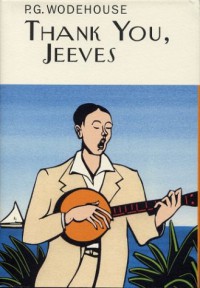
 PG Wodehouse has been on my list of authors to read for ages, and my only complaint is that I waited so long to give him a try.
PG Wodehouse has been on my list of authors to read for ages, and my only complaint is that I waited so long to give him a try. Before picking up Thank You, Jeeves, I had read several of the short stories that introduced the world to the indomitable literary pairing of Bertram Wooster and his faithful valet Jeeves. From the first page of the earliest story, “Extricating Old Gussie,” I knew I had found a series that would give me endless hours of cozy, friendly entertainment in the months and years to come. Some books are meant to prod you into deep reflections, or examine “big” problems, but this is certainly not one of those. Thank You, Jeeves is like a homemade quilt and a cup of hot chocolate in the middle of winter, infinitely comfortable and comforting.
After appearing in multiple short stories, beginning in 1915, Bertie and Jeeves made their jump to a full-length adventure in Thank You, Jeeves (1934). Wodehouse has introduced several delightful characters in his stories, like Uncle Fred and the folks at Blandings Castle, but I think most people would agree that the “Jeeves and Wooster” stories are his ultimate legacy. Bertie, young, scatterbrained and a bit clueless, is perfectly complimented by the eternally cool-headed and logical Jeeves.
In this early installment of a series that would span nearly 40 years, Bertie has taken up playing the banjolele, much to the discomfort of his neighbors. Unfortunately, his generally unflappable valet, Jeeves, is similarly discomposed by his master’s new hobby and leaves poor Bertie, a permanent bachelor and not the most self-sufficient man about town, all alone. To escape the persecution of his aurally assaulted neighbors, Bertie decides to rent a cottage in the country from a good friend, the landed but poor Lord Chuffnell, Chuffy for short. A chance meeting of several characters from earlier stories, a run-in with the local law enforcement, an unfortunate application of boot polish and some lady trouble all add up to a hilarious adventure, with enough convenient but perfectly structured twists to keep you guessing (and laughing). I won’t give it away, but anyone who has ever read anything about Bertie and Jeeves knows who comes to the rescue in the end.
Despite the comedic situations and overall light tone of his work, don’t be deceived into thinking Wodehouse is deficient in serious talent. He may not be interested in the profound, but his plots are structures to be reckoned with, brilliantly layering trouble upon trouble without ever leaving a loose end or pointless observation. He could seriously give Arthur Conan Doyle a run for his money, and make you laugh so hard you never notice all the work he has put into it. Likewise, his ability to use perfect dialog and very little description to create memorable characters is no small feat. It’s a testament to his ability that Jeeves has so frequently been reincarnated in popular culture, in TV shows like “Benson” and “The Fresh Prince of Bel Air.”
The Bertie and Jeeves stories are, essentially, the marshmallow fluff of literature, and while you can’t survive long on a diet exclusively of sweet, fluffy goodness, life would be dull and, well, fluffless without it. And a life without fluff is no life at all.









